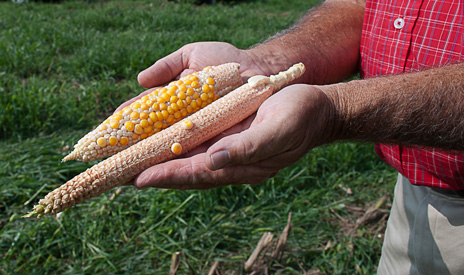Farmers persevering through drought
Farmers persevering through drought

While drought conditions have improved in Central and Eastern Kentucky, farmers are still feeling its effects and will be for some time. With drought-damaged corn and lower feed supplies, producers are preparing for winter and hoping for better weather next season.
For Hart County farmer Tim Isaacs, this was the year he was going to expand his registered Angus operation, with his son Matt returning to the farm. However, the drought stalled the expansion.
“This is a three- to four-year setback,” Matt Isaacs said. “We’re going to have to make the most of it and find different ways to cope.”
In the spring, the Isaacs planted more corn in hopes of having more feed for their planned expansion. Recently, they chopped their entire crop for silage to feed their existing 600 head of cattle this winter. Normally, they would only chop half of their corn acreage for silage and use the other half for grain for winter feeding.
“Even the corn that we have hasn’t produced an ear,” Matt Isaacs said. “It’s changed the entire aspect of feeding cattle. From where corn silage is high in energy, it’s not going to be due to the lack of corn on the stalk.”
Chris Clark, Hart County agriculture and natural resources agent with the University of Kentucky Cooperative Extension Service, said the Isaacs’ corn crop may actually be a little better than average for his county, but it suffered from a lack of pollination due to the drought and triple-digit temperatures earlier this summer.
Corn is not the only crop hurt by the drought. Pastures, especially those with cool-season grasses, have suffered in the heat and the drought. Lack of adequate summer grazing options forced the Isaacs, and many other farmers in the state, to feed hay to their herd much earlier than normal.
The Isaacs’ breeding operation has also suffered with lower instances of successful artificial insemination due to the drought.
“Normally, where we get 80 percent on AI synchronization, I’m only getting 60 percent,” Matt Isaacs said. “That makes it hard on me because we have a production sale in the fall, and my customers want superior genetics. I try and offer them that.”
Isaacs added that he will have to find another market for the cows that were not successfully bred through artificial insemination and those that aborted their calves due to the heat stress.
The Isaacs’ story is not different from what other farmers are experiencing across Hart County and the state, Clark said.
With the corn crop severely damaged by the drought and the heat, many grain producers are chopping their crops for silage and hoping to sell it to livestock producers who are in need of feed.
“We’ve done a lot of calculations with folks trying to price silage from the standpoint of the grain producer and from the standpoint of the livestock feeder and, somewhere in between, they are negotiating on a price,” Clark said. “We also have some custom operators who are offering their services to those who don’t traditionally chop their corn for silage.”
While the Isaacs plan to continue despite the drought damage, Clark said some other producers in his county might consider exiting farming.
“We’ve got one group of farmers in the 60- to 70-year-old range, and they may have intended to be in business for another 10 years. But they’re looking at it and saying maybe it’s time to exit now,” he said. “For some producers financially the only option they’re going to have is liquidate some things. It’s really stressful on a lot of these guys.”
For the Isaacs, the drought may have stalled their plans for expansion, but they will continue to pursue their business goal in upcoming years.
“This is a different ball game, but that’s just part of farming,” Matt Isaacs said. “You learn to adapt and move on, and you persevere.”
Agricultural Economics Extension Weather

